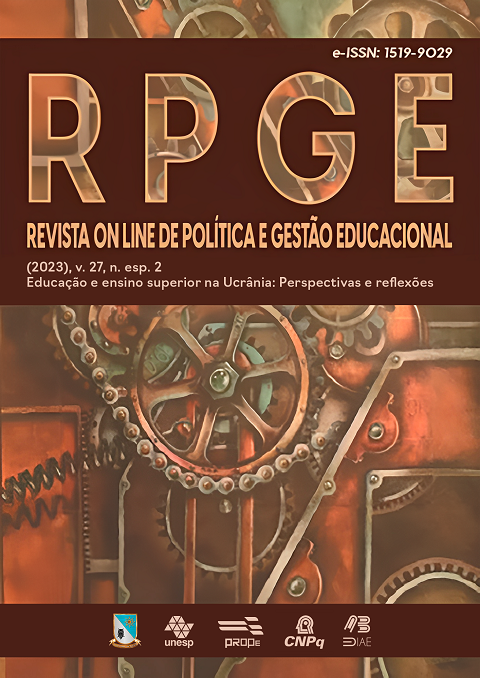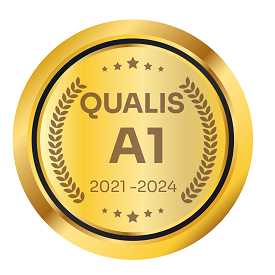El papel de la inteligencia artificial en el desarrollo de métodos y enfoques innovadores en la educación
DOI:
https://doi.org/10.22633/rpge.v27iesp.2.18784Palabras clave:
Inteligencia artificial, Innovaciones educativas, TIC, Paradigma educativoResumen
El propósito del artículo es analizar el discurso científico y educativo sobre la conveniencia de utilizar la inteligencia artificial en el proceso educativo. Se han estudiado unos 50 artículos científicos dedicados a diversos elementos de la IA en el sistema educativo y estructurados en dos grandes grupos: objetivo y funcional. La metodología de la investigación se basa en el análisis científico general y en enfoques metodológicos filosóficos y sinérgicos. Los resultados del estudio indican la actualización de la IA en el sistema educativo y el predominio del aspecto funcional del uso de esta herramienta en la dimensión práctica y pragmática del proceso educativo. Así, la funcionalidad de las herramientas de IA no suscita objeciones en la comunidad científica y educativa. La situación es diferente con el posicionamiento de la inteligencia artificial en la dimensión intuitiva y dirigida de la educación.
Descargas
Citas
AL HASHIMI, S.; AL MUWALI, A.; ZAKI, Y.; MAHDI, N. The Effectiveness of Social Media and Multimedia-Based Pedagogy in Enhancing Creativity among Art, Design, and Digital Media Students. International Journal of Emerging Technologies in Learning, [S. l.], v. 14, n. 21, p. 176–190, 2019. Available at: https://www.learntechlib.org/p/217207/.
ALAM, A. A Digital Game based Learning Approach for Effective Curriculum Transaction for Teaching-Learning of Artificial Intelligence and Machine Learning. In: INTERNATIONAL CONFERENCE ON SUSTAINABLE COMPUTING AND DATA COMMUNICATION SYSTEMS, 2022. Proceedings […]. Erode, India: [s. n.], 2022. p. 69–74. DOI: 10.1109/ICSCDS53736.2022.9760932.
BEARMAN, M.; RYAN, J.; AJJAWI, R. Discourses of artificial intelligence in higher education: a critical literature review. Higher Education, [S. l.], v. 86, p. 369–385, 2023. DOI: 10.1007/s10734-022-00937-2.
BOZKURT, A.; KARADENIZ, A.; BANERES, D.; GUERRERO-ROLDÁN, A. E.; RODRÍGUEZ, M. E. Artificial Intelligence and Reflections from Educational Landscape: A Review of AI Studies in Half a Century. Sustainability, [S. l.], v. 13, 2021. DOI: 10.3390/su13020800.
CELIK, I. Towards Intelligent-TPACK: An empirical study on teachers’ professional knowledge to ethically integrate artificial intelligence (AI)-based tools into education. Computers in Human Behavior, [S. l.], v. 138, 2023. DOI: 10.1016/j.chb.2022.107468.
CHEN, Y.; JENSEN, S.; ALBERT, L.; LEE, T. Artificial Intelligence (AI) Student Assistants in the Classroom: Designing Chatbots to Support Student Success. Information Systems Frontiers, [S. l.], v. 25, p. 161–182, 2023. DOI: 10.1007/s10796-022-10291-4.
CHIU, T.; XIA, Q.; ZHOU, X.; SING CHAI, C.; CHENG, M. Systematic literature review on opportunities, challenges, and future research recommendations of artificial intelligence in education. Computers and Education: Artificial Intelligence, [S. l.], v. 4, 2023. DOI: 10.1016/j.caeai.2022.100118.
CHOI, S.; JANG, Y.; KIM, H. Influence of Pedagogical Beliefs and Perceived Trust on Teachers’ Acceptance of Educational Artificial Intelligence Tools. International Journal of Human–Computer Interaction, [S. l.], v. 39, n. 4, p. 910–922, 2023. DOI: 10.1080/10447318.2022.2049145.
CLANCEY, W.; HOFFMAN, R. Methods and standards for research on explainable artificial intelligence: Lessons from intelligent tutoring systems. Applied AI Letters, [S. l.], v. 2, n. 4, 2021. DOI: 10.1002/ail2.53.
COPE, B.; KALANTZIS, M.; SEARSMITH, D. Artificial intelligence for education: Knowledge and its assessment in AI-enabled learning ecologies. Educational Philosophy and Theory, [S. l.], v. 53, n. 12, 2021. DOI: 10.1080/00131857.2020.1728732.
COOPER, G. Examining Science Education in ChatGPT: An Exploratory Study of Generative Artificial Intelligence. Journal of Science Education and Technology, [S. l.], v. 32, p. 444–452, 2023 DOI: 10.1007/s10956-023-10039-y.
DAI, C.-P.; KE, F. Educational applications of artificial intelligence in simulation-based learning: A systematic mapping review. Computers and Education: Artificial Intelligence, [S. l.], v. 3, 2022. DOI: 10.1016/j.caeai.2022.100087.
DAVY, T.; WANYING, L.; CHAN, H.; CHU, S. Using digital story writing as a pedagogy to develop AI literacy among primary students. Computers and Education: Artificial Intelligence, [S. l.], v. 3, 2022. DOI: 10.1016/j.caeai.2022.100054.
DIYER, O.; ACHTAICH, N.; NAJIB, K. Artificial Intelligence in Learning Skills Assessment: A Pedagogical Innovation. In: INTERNATIONAL CONFERENCE ON NETWORKING, INFORMATION SYSTEMS & SECURITY, 3., 2020. Proceedings […]. New York, , USA: [s. n.], 2020. p. 1–5. DOI: 10.1145/3386723.3387901.
GONZÁLEZ-CALATAYUD, V.; PRENDES-ESPINOSA, P.; ROIG-VILA, R. Artificial Intelligence for Student Assessment: A Systematic Review. Applied Sciences, [S. l.], v. 11, n. 12, 2021. DOI: 10.3390/app11125467.
GUAN, C.; MOU, J.; JIANG, Z. Artificial intelligence innovation in education: A twenty-year data-driven historical analysis. International Journal of Innovation Studies, [S. l.], v. 4, n. 4, p. 134–147, 2020. DOI: 10.1016/j.ijis.2020.09.001.
HODGSON, D.; GOLDINGAY, S.; BODDY, J.; NIPPERESS, S.; WATTS, L. Problematising Artificial Intelligence in Social Work Education: Challenges, Issues and Possibilities. The British Journal of Social Work, [S. l.], v. 52, n. 4, p. 1878–1895, 2022. DOI: 10.1093/bjsw/bcab168.
HOW, M.; HUNG, W. Educational Stakeholders’ Independent Evaluation of an Artificial Intelligence-Enabled Adaptive Learning System Using Bayesian Network Predictive Simulations. Education Sciences, [S. l.], v. 9, n. 2, 2019. DOI: 10.3390/educsci9020110.
HUMENIUK, T.; ROMANIUK, P. On the development of information and communication technologies in education of the future: the possibilities of cloud computing technology. Futurity Education, [S. l.], v. 3, n. 1, p. 32–41, 2023. DOI: 10.57125/FED.2023.25.03.03.
KEIPER, M. ChatGPT in practice: Increasing event planning efficiency through artificial intelligence. Journal of Hospitality, Leisure, Sport & Tourism Education, [S. l.], v. 33, 2023. DOI: 10.1016/j.jhlste.2023.100454.
KOCHMAR, E.; VU, D.; BELFER, R.; PINEAU, J. Automated Data-Driven Generation of Personalized Pedagogical Interventions in Intelligent Tutoring Systems. International Journal of Artificial Intelligence in Education, [S. l.], v. 32, p. 323–349, 2022. DOI: 10.1007/s40593-021-00267-x.
KONIARI, D., RAFTOULIS, G. Digital competence and school leadership in Greece. Futurity Education, [S. l.], v. 3, n. 2, p. 144–155, 2023. DOI: 10.57125/FED.2023.06.25.10.
KRYVOSHEIN, V.; VDOVENKO, N.; BURIAK, I.; SAIENKO, V.; KOLESNYK, A. Innovative educational technologies in management training: experience of EU countries. International Journal of Computer Science and Network Security, [S. l.], v. 22, n. 6, pp. 45–50, 2022. DOI: 10.22937/IJCSNS.2022.22.6.8.
LAMERAS, P.; ARNAB, S. Power to the Teachers: An Exploratory Review on Artificial Intelligence in Education. Information, [S. l.], v. 13, n. 1, 2022. DOI: 10.3390/info13010014.
LAUPICHLER, M.; ASTER, A.; SCHIRCH, J.; RAUPACH, T. Artificial intelligence literacy in higher and adult education: A scoping literature review. Computers and Education: Artificial Intelligence, [S. l.], v. 3, 2022. DOI: 10.1016/j.caeai.2022.100101.
LEWIS, A.; STOYANOVICH, J. Teaching Responsible Data Science: Charting New Pedagogical Territory. International Journal of Artificial Intelligence in Education, [S. l.], v. 32, p. 783–807, 2022. DOI: 10.1007/s40593-021-00241-7.
LOFTUS M.; MADDEN M. A pedagogy of data and Artificial Intelligence for student subjectification. Teaching in Higher Education, [S. l.], v. 25, n. 4, pp. 456–475, 2020. DOI: 10.1080/13562517.2020.1748593.
LORENZO, N.; GALLON, R. Smart Pedagogy for Smart Learning. In: DANIELA, L. (org.). Didactics of Smart Pedagogy. 2019. DOI: 10.1007/978-3-030-01551-0_3.
MARKHAM, A. Taking Data Literacy to the Streets: Critical Pedagogy in the Public Sphere. Qualitative Inquiry, [S. l.], v. 26, p. 227–237, 2020. DOI: 10.1177/1077800419859024.
MARTINS, R.; VON WANGENHEIM, С. Findings on Teaching Machine Learning in High School: A Ten - Year Systematic Literature Review. Informatics in Education, [S. l.], v. 22, n. 3, p. 421–440, 2023. DOI: 10.15388/infedu.2023.18.
MURAINA, I. Resolving Misconception Challenges in the Teaching and Learning of Computer Science Amongst First-Year Undergraduate Students. Futurity Education, [S. l.], v. 3, n. 3, p. 151–164, 2023. DOI: 10.57125/FED.2023.09.25.08.
RAJI, I.; SCHEUERMAN, M.; AMIRONESEI, R. You Can't Sit With Us: Exclusionary Pedagogy in AI Ethics Education. In: CONFERENCE ON FAIRNESS, ACCOUNTABILITY, AND TRANSPARENCY, 2021. Proceedings […]. New York, USA: [s. n.], 2021. p. 515–525. DOI: 10.1145/3442188.3445914.
SADOVYI, M.; TERENKO, O.; FILIMONOVA, T.; MALANCHUK, S.; VOVKOCHYN, L.; PASLAWSKA, A.; OROS, І. The Use of Information and Communication Technologies in Education of Students' Civic Responsibility. International journal of computer science and network security, [S. l.], v. 22, n. 7, p. 213–219, 2022. DOI: 10.22937/IJCSNS.2022.22.7.26.
SALTMAN, K. Artificial intelligence and the technological turn of public education privatization: In defence of democratic education. London Review of Education, [S. l.], v. 18, n. 2, p. 196–208, 2020. DOI: 10.14324/LRE.18.2.04.
SANUSI, T.; OYELERE, S. Pedagogies of Machine Learning in K-12 Context. In: 2020 IEEE Frontiers in Education Conference, Uppsala, Sweden, 2020. p. 1–8. DOI: 10.1109/FIE44824.2020.9274129.
SCHIFF, D. Out of the laboratory and into the classroom: the future of artificial intelligence in education. AI & Society, v. 36, 2021. DOI: 10.1007/s00146-020-01033-8.
SEREDA, І. Blended learning implementation during training the teachers of special education in the conditions of quarantine. Information Technologies and Learning Tools, [S. l.], v. 88, n. 2, p. 239–254, 2022. DOI: 10.33407/itlt.v88i2.4532.
SHALINI, G.; SHIPRA, S. Impact of Artificial Intelligence in Special Need Education to Promote Inclusive Pedagogy. International Journal of Information and Education Technology, [S. l.], v. 10, n. 7, 2020. DOI: 10.18178/ijiet.2020.10.7.1418.
SONG, P.; WANG, X. A bibliometric analysis of worldwide educational artificial intelligence research development in recent twenty years. Asia Pacific Education Review, [S. l.], v. 21, p. 473–486, 2020. DOI: 10.1007/s12564-020-09640-2.
TEDRE, M.; TOIVONEN, T.; KAHILA, J.; VARTIAINEN, H.; VALTONEN, T.; JORMANAINEN, I.; PEARS, A. Teaching Machine Learning in K–12 Classroom: Pedagogical and Technological Trajectories for Artificial Intelligence Education. IEEE Access, [S. l.], v. 9, p. 110558–110572, 2021. DOI: 10.1109/ACCESS.2021.3097962.
VAN DER NIET, A.; BLEAKLEY, A. Where medical education meets artificial intelligence: ‘Does technology care? Medical Educational, [S. l.], v. 55, p. 30–36, 2020. DOI: 10.1111/medu.14131.
VASYLYUK-ZAITSEVA, S.; KOSENYUK, H.; TANASIICHUK, I.; BOYKO, J. Application of artificial intelligence in Ukrainian education of the future. Futurity Education, [S. l.], v. 3, n. 3, p. 77–103, 2023. DOI: 10.57125/FED.2023.09.25.05.
VÁZQUEZ-CANO, E. Artificial intelligence and education: A pedagogical challenge for the 21st century. Educational Process: International Journal (EDUPIJ), [S. l.], v. 3, p. 7–12, 2021. DOI: 10.22521/edupij.2021.103.1.
VOROPAYEVA, T.; JÄRVIS, M.; BOIKO, S.; TOLCHIEVA, H.; STATSENKO, N. European experience in implementing innovative educational technologies in the training of management specialists: current problems and prospects for improvement. IJCSNS International Journal of Computer Science and Network Security, [S. l.], v. 22, n. 7, p. 294–300, 2022. DOI: 10.22937/IJCSNS.2022.22.7.35.
XU, J.; BABAIAN, T. Artificial intelligence in business curriculum: The pedagogy and learning outcomes. The International Journal of Management Education, [S. l.], v. 19, n. 3, 2021. DOI: 10.1016/j.ijme.2021.100550.
ZAWACKI-RICHTER, O.; MARÍN, V.; BOND, M.; GOUVERNEUR, F. Systematic review of research on artificial intelligence applications in higher education – where are the educators? International Journal of Educational Technology in Higher Education, [S. l.], v. 16, n. 39, 2019. DOI: 10.1186/s41239-019-0171-0.
ZHAI, X.; CHU, X.; SING CHAI, C.; YUNG JONG, M.; ISTENIC, A.; SPECTOR, M.; LIU, B.; YUAN, J.; LI, Y. A Review of Artificial Intelligence (AI) in Education from 2010 to 2020. Hindawi Complexity, [S. l.], 2021. DOI: 10.1155/2021/8812542.
Descargas
Publicado
Cómo citar
Número
Sección
Licencia
Derechos de autor 2023 Revista on line de Política e Gestão Educacional

Esta obra está bajo una licencia internacional Creative Commons Atribución-NoComercial-CompartirIgual 4.0.
Manuscritos aceitos e publicados são de propriedade da Revista on line de Política e Gestão Educacional. É vedada a submissão integral ou parcial do manuscrito a qualquer outro periódico. A responsabilidade do conteúdo dos artigos é exclusiva dos autores. É vedada a tradução para outro idioma sem a autorização escrita do Editor ouvida a Comissão Editorial Científica.











